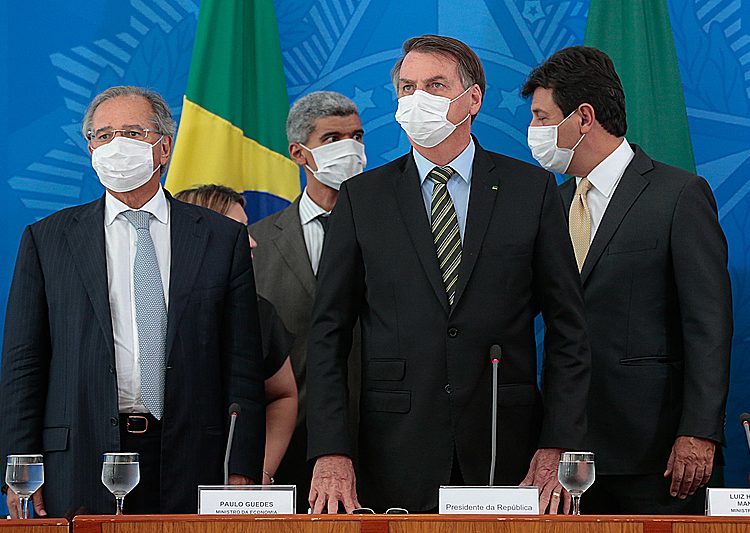The tardy and all over the place responses of the Brazilian government in combating the coronavirus, have rapidly brought about different epicenters of the disease in the country, which is a disadvantage in relation to nations that have shown better results against covid-19. The analysis comes from geographer and data manager Ronnie Aldrin Silva, who specializes in topics related to governance, social exclusion and the labor market.
Different than, for example, China and South Korea, who hastily isolated areas with the most infections and have been able to stabilize the spread of the pandemic, Brazilian authorities hesitated to enact measures that would avoid the dissemination of the virus countrywide. From the German capital Berlin, where he currently resides, Ronnie has been following the evolution of the pandemic in Brazil, which saw community transmissions quickly take hold.
“Covid-19 is unfolding in different ways in each state. Since there is no unified directive from the Federal Government, each state authority takes its own steps, very often not taking things very seriously. We’ve lost our awareness of how serious the situation is”, he asserts. According to the Ministry of Health, all Brazilian states as well as the Federal District have confirmed cases of the disease.
The researcher points out that the consequences in Brazil have been similar to those in the United States, whose president, Donald Trump, initially adopted the same skeptical discourse as Jair Bolsonaro in relation to the virus.
“In the United States, Trump’s initial posture was very similar to that of Bolsonaro. As things stand, by the end of this week, the US risks becoming the global epicenter of the epidemic. The numbers there are growing a lot, bearing many similarities to what’s happening in Brazil: having various locations where the disease is spreading. It’s popping up all over the place over there”, he points out.
For Ronnie, what remains to be done by the Brazilian government – especially the president – is to issue unified decrees to states and municipalities. “The most important thing to have is a coordinated response by the Federal Government, with the presidency playing a role, putting forth orders for each state to follow. We’re missing a compass, a response package, for all states to adopt”, he emphasized.
Controlling the pandemic, must, necessarily go through a process of monitoring cases with more precision, says the expert. Since levels of testing have been low in Brazil, as the Ministry of Health itself admits, it becomes impossible to take any assertive measures.
“The biggest risk is for you to enact policies that are completely disconnected from reality. These sorts of policies lead nowhere, they only waste public resources. You need to know how and where to invest. If you don’t have the data, the government ends up playing a guessing game”, he posits.
A study done by researchers at the London School of Tropical Medicine, estimates that only 11% of cases in Brazil have been diagnosed. This means that at this moment, the country would have 25,000 cases of covid-19, being that, until this last Tuesday (24), the official number given by authorities is 2,201.
“The test needs to be administered on everyone. The majority of contagion happens by asymptomatic people, meaning, persons that will not be identified without testing. If you keep asymptomatic people around, they will keep spreading the virus”, affirms Ronnie.
The researcher identifies lack of investment in testing as “jackass economics”. Sometimes you have to spend more now to loose less in the future. You must invest a lot in testing to reduce the duration of the pandemic, only then can the economy go back to normal. The sooner you do it, the cheaper it is”, he adds.
A change in leadership
Neuroscientist Miguel Nicolelis, medical doctor graduate of the University of São Paulo (USP), and currently a professor at Duke University in the US, considers the Brazilian government incompetent in its response to such a dire situation.
He defends that the coordinated efforts against the coronavirus should no longer be a responsibility of the executive branch, and be transferred to the legislative, or in the worst case scenario, to state and municipal level entities.
“It has become abundantly clear that the executive branch doesn’t have the reach, nor the ability to deal with what is happening. The other two branches of government need to step in. If they do not, or choose to go down in history as enablers of the catastrophe, governors and civil society need to take matters into their own hands, at a national, state or municipal level”, argues the physician.
Nicolelis suggests the creation of a national committee, comprised of civil society members, to fight the pandemic. “We have to get the best minds in Brazil together, in all the different sectors that will be affected”, he commented.
“You need synchronized responses, gathering data, to understand the real situation. We need to know where our biggest weaknesses are, identify critical problems, like having enough beds, ICU units, hospital needs, the need to borrow hospital beds from the private sector, how you will keep cities supplied with goods, how you’ll maintain people’s income. In other words, there are a multiplicity of actions that should have been taken weeks ago”, declares the neuroscientist.
The professor points out that the population, starting with Bolsonaro, still hasn’t grasped the seriousness of the moment we are currently in – according to him, the gravest in Brazilian history. “It’s a war. You only win wars with leadership, with all of society coming together, with clear a clear and coordinated message (…) The ambiguity of the information being passed on by the Federal authorities, is contributing to society’s lack of awareness of what is to come. Each day that this ambiguity continues, makes the death toll ever higher a few weeks from now”, he concludes.




